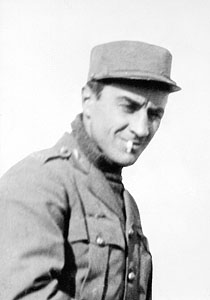James Norman Hall
| James Norman Hall | |
|---|---|

Hall in the Lafayette Escadrille, 1917
|
|
| Born |
22 April 1887 Colfax, Iowa |
| Died | 5 July 1951 (aged 64) Tahiti |
| Occupation | novelist, memoirist |
| Nationality | American |
| Period | 1916–1951 |
| Genre | Adventure fiction |
| Subject | War memoir |
| Website | |
| www |
|
James Norman Hall (22 April 1887 – 5 July 1951) was an American author best known for the novel Mutiny on the Bounty with co-author Charles Nordhoff. During World War I, Hall had the distinction of serving in the militaries of three Western allies: Great Britain as an infantryman and then flying for France and later the United States.
Hall was born in Colfax, Iowa, where he attended the local schools. Hall graduated from Grinnell College in 1910 and became a social worker in Boston, Massachusetts, while trying to establish himself as a writer and studying for a master's degree from Harvard University.
Hall was on vacation in the United Kingdom in the summer of 1914, when World War I began. Posing as a Canadian, he enlisted in the British Army, serving in the Royal Fusiliers as a machine gunner during the Battle of Loos. He was discharged after his true nationality was discovered, and he returned to the United States and wrote his first book, Kitchener's Mob (1916), recounting his wartime experiences. Kitchener's Mob sold moderately well in America following its publication and after a speaking tour to promote the book, Hall returned to Europe in 1916 on assignment with Atlantic Monthly Magazine. He was to have written a series of stories about the group of American volunteers serving in the Lafayette Escadrille, but after spending some time with the American fliers Hall himself became caught up in the adventure and enlisted in the French Air Service. By then the original Escadrille had been expanded to the Lafayette Flying Corps, which trained American volunteers to serve in regular French squadrons.
During his time in French aviation, Hall was awarded the Croix de Guerre with five palms and the Médaille Militaire. When the United States entered the war in 1917, Hall was made a captain in the Army Air Service. There he met another American pilot, Charles Nordhoff. After being shot down over enemy lines, Hall spent the last months of the war as a German prisoner of war. After being released, he was awarded the French Légion d’Honneur and the American Distinguished Service Cross
...
Wikipedia
